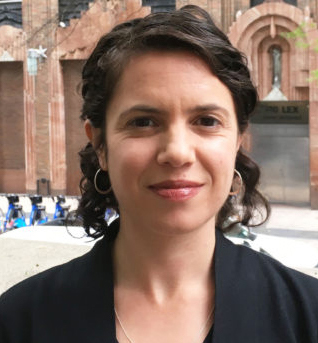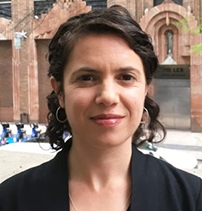PERI ECONOMIST INTERVIEW SERIES
Lenore Palladino
This is part of PERI's economist interview series, hosted by C.J. Polychroniou.
Read Lenore's bio here.

C.J. Polychroniou: Why did you decide to become an economist?
Lenore Palladino: I spent a lot of time in college working with workers’ rights organizations and was very active in the global justice movement of the late 1990s, organizing at big protests against the IMF and World Bank. At the same time, I was an undergraduate at the University of Chicago. I was working with an organization in Mexico when a young community leader told me, “neoliberalism is killing us.” I went home to Hyde Park and realized that I needed to understand the tools of this discipline—economics—that shaped the problems that we were trying to solve. It was not enough to simply critique the impact of the Chicago School on the world; I needed to be able to argue from a solid theoretical and empirical basis. I applied to the Master's program at the New School that focused on the Global Political Economy, and immediately realized that there was more to economics than the way it was taught at the University of Chicago.
I continued on in the PhD program because I really enjoy the questions that we ask as economists, and I believe deeply in using a rigorous and principled approach to analyzing economic policy. I also believe that good political economists are an indispensable part of social movements. I am, quite frankly, not someone who ever thought that I would be an academic economist; and I hope in my teaching and mentoring of students to demonstrate that economics is a fantastic profession for those of us who believe in social change. I would not be here without the encouragement and example of my mentor and dissertation advisor, Teresa Ghildarducci, whose work is grounded in real-world policy reform and who always took the time to make sure that I could see myself in the profession; and I hope to pass the example forward.
CJP: You also have a law degree. In what ways does legal training help you with the work you want to do in economics?
LP: My legal training is a great complement to my training as an economist, in that it helps me to fully understand how policy works, and how laws, regulations, and social norms shape economic interactions. Because so much of my work is focused on direct policy analysis and reforms, my legal experience assists me in understanding the nuances of how, for example, the securities and corporate laws shape corporate finance transactions. I am very excited by the growing law-and-political-economy community, as I believe that legal scholars and economists have a great deal of common ground.
CJP: Much of your research revolves around financialization and corporate governance. Why have you chosen to focus on these topics?
LP: I worked as a union organizer while I was in graduate school and have always been interested in questions of corporate power. As we emerged from the Great Recession, I became more and more interested in the many disconnects between the stock market and the recovery in corporate profits and wage stagnation. I came to feel that shareholder primacy as the governing mode of corporate behavior was well-understood in corporate finance and legal circles, but not by those who were advocating for workers’ rights or even among political economists more broadly (with obvious exceptions, including my colleagues at PERI). I became fascinated by the legal and economic architecture of corporate decision-making, and how it justifies squeezing worker costs in the 21st century. I have several strands of overlapping research along two tracks: understanding the impacts of shareholder primacy, and promoting a stakeholder theoretical orientation to the corporation and policies meant to implement this new orientation.
CJP: Companies working for the benefit of all stakeholders – customers, employees, communities, and shareholders – is a vision that seems to be gaining ground among chief executive officers. In your own work, you are also arguing for a transition to stakeholder corporations. Is this enough in making capitalism truly accountable and begin to provide a solution to some of the pressing economic and social problems facing the United States today?
LP: In short, no, of course not. We need major public investments to transition to a clean energy economy; we need reparations and major restructuring of policing and the courts to deal with structural racism; care labor must be valued; and so much more. Yet I do think that transitioning to a stakeholder view of corporations is an important step to reversing the extreme extraction by executives and shareholders of the value created by multiple stakeholders, first among equal workers. I do think that there are certain types of economic activities that should be public—to transform health care, for example, it would not be enough to simply implement stakeholder governance. But for sectors of the economy where private production is useful, I think corporate governance should include multiple stakeholder groups, and corporate directors should be accountable to those stakeholder groups. One current area of my research is to think about how to actually empower stakeholders beyond employees. I part ways with the Business Roundtable and many corporate executives who are promoting a ‘new’ stakeholder approach but do not want to see corporate law changes; I believe we need major reforms to corporate, securities, and labor law to end shareholder primacy.
CJP: Worker representation on company boards is common in many European countries, including, among others, Austria, Denmark, Finland, France, Luxembourg, the Netherlands, and Norway, but not in the U.S.A. Given that the rate of unionization is very small in the United States (slightly more than 6% in the private sector and continues to decline), how could worker representation function in an American context?
LP: At the most straightforward level, worker representation requires a way for workers to organize themselves, elect representatives, and communicate with those representatives. I have a working paper on how to structure worker representation and why it can work effectively with reforms in labor law on SSRN: Briefly, effectively implementing such a reform in the 21st century, U.S. context requires consideration of several key issues, including how many directors should represent employees; how they should be chosen and who is considered a ‘worker’ when the choice is made; how worker-directors should meaningfully represent workers, and what information the board owes the workforce; how these choices are different in a unionized or non-union context; and the relationship between a worker’s role as director and as an employee.
CJP: Wealth inequality continues to grow in the United States, with a handful of men holding more combined wealth than the poorest half of Americans. Through what means can we reduce the concentration of wealth at the top of the economic pyramid?
LP: My work focuses on ending shareholder primacy, which is the dominant ideology of how private corporations make decisions and view their responsibilities; i.e., to maximize wealth for their shareholders, whether or not their actions negatively impact both their internal stakeholders (workers), or the larger public and natural world. There are obviously deeply entrenched structures of structural racism and other forms of oppression, and a real gap in public investment in social needs, all of which need to be addressed to comprehensively address inequality. I will simply make a few comments on the area that I research.
Shareholder primacy has been a major driver of the increase of wealth at the top, as 88 percent of corporate equity is owned by the top 10 percent of households by wealth distribution, while the bottom fifty percent owns just .8 percent (not 8, .8!) of corporate equity. White households own 92 percent of corporate equity. (I have a working paper on the Contribution of Shareholder Primacy to the Racial Wealth Gap that digs into the connection between these two critical topics more deeply).
I believe that ending shareholder primacy is a necessary—though completely insufficient on its own—step towards reducing the concentration of wealth at the top. I lay out a series of policies to end shareholder primacy in a paper called “The Economic Argument for Stakeholder Corporations,” and I am engaged in developing all of the ideas in the paper more deeply. I agree with Thomas Piketty, who proposes two key reforms in his recent book, Capital and Ideology: progressive taxation and stakeholder governance. I wrote my dissertation on the financial transaction tax, and I believe that progressive corporate and financial taxation is another key building block to a more equitable society.



